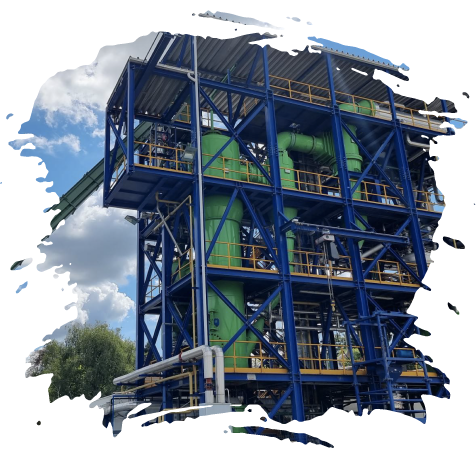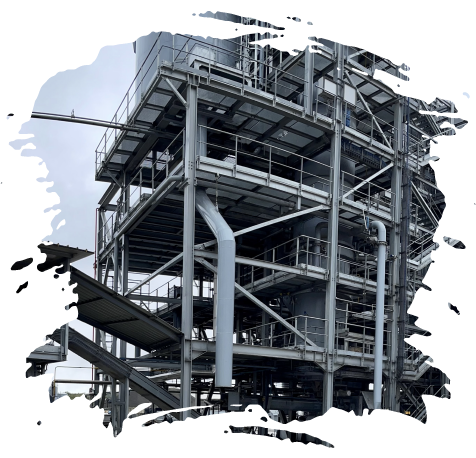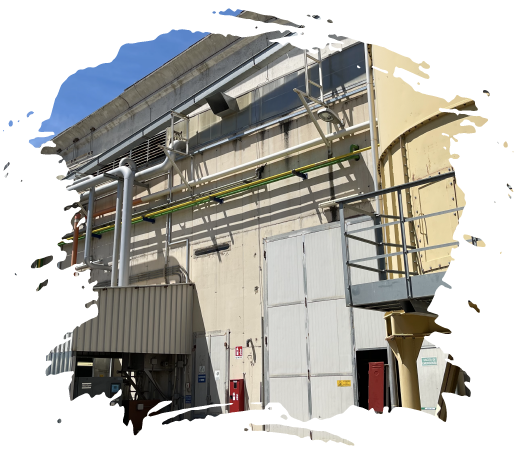Corporate governance
The EQTEC plc corporate governance statement in full
Jeff Vander Linden (COO) and Ian Pearson (Chairman)
The Board of Directors is committed to the highest standards of corporate governance and has adopted the principles outlined in the Quoted Companies Alliance’s Corporate Governance Code (the QCA Code).
Chairman Ian Pearson, in his capacity as an independent director, has ultimate accountability for application of corporate governance standards aligned to these principles, by the Board and across the Group.
This section was last updated on 04 April 2024.
Strategy and business model
The Company’s strategic intent is to be the leading technology innovator and licensing partner of syngas solutions for production of renewable, baseload energy and biofuels. The Company’s business strategy focuses on development of the market for syngas solutions, positioning of EQTEC as a leading innovator within it and scale-up of the business through replicable solution design, integration and maintenance support for Industrials, Utilities, Municipalities and remote communities. Critical for success with this strategy are: (1) reference centres that demonstrate EQTEC solutions in live, commercial-scale plants; (2) partnership with the best developers, builders and operators of new energy infrastructure; and (3) continuous improvement and innovation of EQTEC core technology and customer solutions.
EQTEC’s syngas solutions target specific market segments for advanced waste-to-energy facilities

Industrial
∙ Syngas to electron or molecule
∙ Circular, industrial waste-to-value
∙ On-premise or near-premise
Reference: Belišće, Croatia

Municipal
∙ Syngas to electron or molecule
∙ Municipal, mixed waste
∙ Circular and local
Reference: (work in progress)

Utility
∙ Syngas to electron or molecule
∙ Decarbonisation of estate
∙ Future business models
Reference: Grande-Combe, France

Agricultural
∙ Biomass to syngas
∙ Remote, autonomous
∙ Circular and local
Reference: Gallina, Italy
The Company generates income through three revenue streams:
- Services. This includes solution design and engineering, cost estimation, plant commissioning, performance testing and operational training & handover support to the plant operations team.
- Equipment Delivery. This includes equipment specification, contract manufacturing, quality assurance, logistics handling, and on-site inspection & construction advisory during plant build.
- Licencing and Support. This includes provision of IP rights with data-based monitoring, ongoing training & support for operations, extended maintenance support or other live plant support.
Given that the Company has a growing but relatively small number of plants in operation, current revenues are primarily from Services and, increasingly, Equipment Delivery. As more plants applying EQTEC technology come online, the Company anticipates growing revenues from Licensing and Support.
EQTEC technology is advanced gasification technology. Gasification has been well established for decades in the fossil fuel industry for conversion of homogenous fuel with high-calorific value such as coal into a synthesis gas (syngas) to be applied largely in industrial process such as steel or concrete manufacturing. However, conversion of often heterogenous biomass, industrial waste or municipal waste into syngas has been a challenge for aspiring companies in the waste management and clean energy sectors. EQTEC’s success with waste-to-syngas conversion was established over a decade ago. The Company is focused now on developing a range of syngas-based solutions with advanced biofuels such as renewable natural gas (RNG), hydrogen and liquid fuels, to add to its existing solutions for electrical power generation, thermal energy generation and biochar production.
The Company’s solutions are defined by the overall objectives for the plant under development by a customer. Specifically, this includes the size, location, local community and the type of biomass or waste conversion targeted. For example:
- an Industrial customer might target an on-premises facility, right-sized to its forecast volumes of industrial waste and able to generate sufficient energy to power its on-site production processes
- a Utility customer might target decarbonisation of an existing, legacy power plant with augmentation of that plant with an EQTEC syngas solution that supports gradual transition from the legacy to future infrastructure
- a Municipal client might see the potential for eliminating transport of municipal waste over distance, by building a right-sized EQTEC facility on the site of its local waste management centre, to eliminate waste locally and convert it into a valuable source of energy for the local community
The Company recognises patterns in requirements from customers and seeks to establish a limited catalogue of solutions that appeal across these sectors and allow the Company to scale its licensing business.
EQTEC’s technologies are in demand from markets around the world and can be applied equally well to Industrial, Utility and other customers in any of those geographies. On the other hand, supply market differences and tariffs, incentives and regulatory regimes make some markets more attractive to the Company than others. The Company continues to review the changing conditions across markets and to prioritise the application of its limited resources to the most attractive markets. As the Company grows, it looks forward to making its technologies available to more customers in more markets.
In the near term, the Company is focused on establishing credibility with target customer segments through its reference plants and with its growing, reliable partner network. The Board believes that near-term shareholder value will be delivered through greater market recognition and an increasing market capitalisation as the Company executes its business strategy.
EQTEC plc is quoted on the AIM market of the London Stock Exchange (LSE), bears the Green Economy Mark awarded by the LSE, and trades as AIM:EQT.
Stakeholder responsibilities
EQTEC’s technology and services have a positive impact on societies, economies and the environment. We strive to deliver sustainable outcomes for businesses and communities through use of our technology, and to always deliver to the highest environmental, regulatory and business standards and practices.
Through transforming non-recyclable wastes into clean syngas for application to baseload energy and biofuels, we reduce the need for less environmentally friendly methods such as incineration and landfill. As a result, EQTEC solutions will contribute substantially to reduction of greenhouse gas (GHG) emissions and thus to meeting local and global Net Zero targets. Because EQTEC’s solutions support autonomous plants of small, medium or large scale, we also support localised power or biofuel production in remote locations, thus supporting the UK’s levelling-up agenda and similar agendas for energy security and independence.
In 2023, the Company successfully achieved certification against three groups of standards set by the International Organisation for Standardisation (ISO): ISO 9001 for Quality Management, ISO 14001 for Environmental Management and ISO 45001 for Occupational Health & Safety.
The Board recognises that the ongoing and long-term success of the Group is significantly influenced by the efforts and commitment of the Group’s employees, strategic partners (including but not limited to those with expertise in funding, technology, operational delivery and go-to-market), contractors and suppliers and on the Group’s relationships with these and other stakeholders including customers, investors, industry associations, political and media organisations, analysts, communities, the wider public and the regulators. The Board has put in place a range of processes and systems to ensure that there is close Board oversight and contact with its key resources and relationships.
Code of conduct
The Group maintains and applies its own Code of Conduct. In alignment with the various legal and regulatory frameworks governing companies in the jurisdictions where the Company operates, EQTEC recognises its ethical and social responsibilities regarding how it conducts business in any and all markets. The EQTEC Code of Conduct is a summary of EQTEC’s expectations for all Group-related business conduct, which it requires of its Group directors (executive and non-executive), its permanent employees, its contractors and consultants, its joint venture directors & employees and its partner organisations.
The Code of Conduct represents EQTEC’s summary of its minimum expectations for how its people and partners conduct any EQTEC-related business in any situation, in any part of the world. These expectations are non-negotiable and must be addressed by all EQTEC people and partners. The code covers six areas of business conduct: (1) health, safety and environment; (2) discrimination and harassment; (3) safeguarding and company assets; (4) conflicts of interest; (5) anti-bribery and corruption; and (6) competition and trade control.
Engaging and communicating with shareholders
The Board is committed to constructive communication with its shareholders. In line with the AIM Rules for Companies, EQTEC publishes the most relevant news for shareholders through the Regulatory News Services (RNS) of the London Stock Exchange. It does this in consultation with its Nominated Advisor and other advisors. The Company posts on social media and its website provides direct channels for communication with the Company from a variety of stakeholder groups.
From time to time, the leadership of the Company joins video interview sessions that are posted on the internet for access by shareholders and other interested stakeholders. These typically focus on recent Company news but offer deeper insights from EQTEC leadership into the decisions of the business and how these align to execution of the Company’s strategy.
All shareholders are invited to attend the Company’s Annual General Meeting (AGM) where they have the opportunity to pose questions directly to the directors of the Company. Investors also have access to current information on the Company though its website, www.eqtec.com.
Corporate risk management
Identification, management and mitigation of risk is critical to the Company’s achievement of its strategic objectives. Corporate risk management controls have been integrated by the Board to support its assessment of EQTEC’s exposure to risk and to drive active mitigation, focused first on high probability/high impact risks. In addition, the Group has defined and implemented a variety of policies across the Group to proactively mitigate any risks associated with bribery, share dealing and insider trading legislation.
Given the current size of the organization and close, day-to-day control exercised by the executive directors, the Board takes the view that an internal audit function is not necessitated at this stage. However, the Board will continue to monitor the need for an internal audit function and take steps should it be necessary to do so.
The principal risks to achievement of the Company’s strategic business objectives are outlined below, together with their potential impacts and mitigation measures in place. The Board believes these risks to be currently the most significant with the potential to impact delivery of the business strategy, financial and operational performance and ultimately, the Company’s reputation. The Board reviews and updates its risk register on a regular basis as part of its commitment to effective risk management.
KEY AREA
Mitigation
Reliance on material counterparties
EQTEC has one or more specific roles in the value chain for development, construction and operation of plants running its technology. Successful completion of large-scale infrastructure projects depends on a wide range of other players including developers, funders, government agencies at all levels, EPC or other Contractors, insurers, banks and a range of subcontractors. EQTEC’s ability to commission and support plants running its technologies is dependent therefore on these third parties as well as the owner-operator clients behind them. Successive project failures due to matters beyond EQTEC’s own control could materially impact Company revenues and potentially limit our ability to trade.
One of the three pillars of EQTEC’s business strategy is the establishment and maintenance of strong partnerships with the world’s most reliable and respectable funding, development, EPC, operations and technology partners. Avoiding less experienced partners with limited track record will significantly reduce the chances of project failure and ensure that EQTEC’s technology can be commissioned for the long-term operational and financial success of the plant. EQTEC vets its prospective partners and favours credit-rated partners with strong internal capability and reliable supply chains. Additionally, EQTEC contracts for a very clear scope of supply with guarantees focused on variables within its direct control.
Attracting and retaining talent
The paradox of being a small and early-stage business is that the Company requires highly experienced, autonomous and entrepreneurial directors and staff even more than it requires younger talent. Despite such experienced leaders being few and highly sought after, the Company must compete with larger, better funded companies for them. Failure to attract the right leaders or to maintain the right balance between capable leaders and talented staff could impact the Company’s ability to achieve its strategic objectives in good time. As we continue to grow and diversify into new areas, this risk will continue to be a focus for the RemCo and Board of Directors.
The Company targets upper-quartile candidates for directors and engineers and upper-half candidates for business development and other non-engineering roles. Remuneration is aligned to this, and includes base pay, performance bonus (currently paused) and incentives for employees to own the business (currently being redefined). The Board of Directors seeks to engender a culture of supported leadership, which includes a high degree of autonomy for self-motivating performers, with team collaboration and backup from highly capable leaders in key management roles. The Company benchmarks its remuneration and employment policies with others in the market.
Political and regulatory risk
EQTEC’s technology is by its nature generally geography-agnostic. That creates a broad scope for application to a range of waste and energy needs in a wide range of markets. However, as the world transitions from traditional waste management and energy generation approaches, some regulatory environments provide greater incentives for investment and implementation of new energy infrastructure solutions including EQTEC’s solutions. At the same time, regulatory terms and conditions are changing rapidly, both in favour of and sometimes against the progress of new energy infrastructure including EQTEC. Ultimately, the risk of regulatory support or difficulty is held not by the Company but by the client that owns the project. However, the knock-on impact is that EQTEC may commit significant work to progress the project, only to find that the project is unable to proceed.
The Company selects its target markets and target clients based upon the stability and policy direction apparent in the regulatory market where they operate and/or where they intend to implement a project with EQTEC technology. The Company also finds itself focusing increasingly on market environments where public and/or private funding is increasingly inclined or specifically allocated for investments in new energy infrastructure. The Company mitigates the risks of delay, disruption or abandonment of client projects by increasing its pipeline of projects and allocating resource to those moving forward, as it awaits further progress from clients on slower-moving projects. The Company anticipates that its portfolio will grow as demand increases, but also as such risks are seen to increase. The Company employs local expertise for local client relationships and to drive and monitor progress.
Reputational risk
Especially as a small company with an as-of-yet underdeveloped brand recognition, every deployment of EQTEC capability and technology is risky in terms of establishing EQTEC’s reputation for quality of delivery, sustainable operation and commercial success. Association with a badly managed or slow-moving project, even if such issues have nothing to do with EQTEC’s performance, will inevitably reflect on EQTEC’s market reputation. This in turn could turn away potential clients, investors, employees, suppliers or other key stakeholders. Additionally, issues within the Company’s own control related to financial control, statutory compliance or other such obligations would call into question the good intentions of the Board of Directors, even if such matters were simply mishandled by the management of the business.
For matters directly within the control of the Company, strong corporate governance, policies and procedures are in place, communicated to all staff and continuously improved to maximise the Board of Directors’ visibility and direct control of critical decisions and toward best business outcomes for the Company and its stakeholders. With regard to reputational risk undertaken by the business through engagement with clients and others in projects, the Company has invested in stringent contracts that minimise the scope of risk taken on by the Company and maximise its ability to withdraw from projects it views as highly risky, even after the contract has been executed. Additionally, the Company has focused its engagement on a small number of key clients, suppliers and partners so that it can deepen relationships and broaden the range of projects the Company undertakes with others aligned to its approach to business.
Funding of the business
The Company’s strong intent is to become a revenue-funded business as soon as possible. Until revenues are sufficient to fund the Company’s working capital including payroll, fixed costs and essential suppliers, the Company must generate a mix of debt financing and equity investment to support its ambition to become a sustainable, growth business. Capital markets, particularly for small-cap companies tightened in early 2022 and although they are now starting to look again at small-cap, market sentiment toward renewable energy stocks is not as strong as in recent years. The Company faces hardship in raising capital in the market until its market position and/or market sentiment returns for small-cap renewable stocks.
The Company has pursued both debt and equity solutions from known and/or reliable small-cap investors for tactical, short-term funding. In addition, the Company is pursuing one or more strategic investors able to take a longer-term view of the Company’s potential and to support it through the coming months and years of potentially low-return growth. The Company in 2023 did a full review of its cost base and significantly reduced its working capital requirements. We oversee and monitor financial performance and cash conversion rigorously, at leadership level. This includes daily monitoring of bank balances, weekly cash review, and maximum monthly financial performance and balance sheet reviews.
Governance structures and processes
Authority for all aspects of the Group’s activities rests with the Board of Directors. The respective responsibilities of the Chairman and Chief Executive Officer arise as a consequence of delegation by the Board. The Board has adopted two statements; the first sets out matters reserved for the Board and the second establishes the policy on delegation of authority. The Chairman is responsible for the effectiveness of the Board, while management of the Group’s business and primary contact with shareholders has been delegated by the Board to the Chief Executive Officer.
The Board of Directors meets at least eight times a year to review corporate performance against established targets in the annual business plan, financial status as reported through established financial reporting standards against standard, IFRS-compliant procedures and to consider corporate risk and mitigation of it. In addition to this standing agenda, the Board also reviews from time to time the status of specific projects, progress with the Company’s R&D programme or other specific, operational matters that are of special significance to the Company’s development.
The Board of Directors has established an Audit Committee and a Remuneration Committee, each of which meets a minimum of two times per year. The Board has agreed that appointments to the Board are made by the Board as a whole and so has determined that a separate Nominations Committee is unnecessary.
Executive and non-executive directors are subject to regular review and retirement as prescribed in the Company’s Articles of Association. At each Annual General Meeting one-third of the Directors subject to retirement by rotation shall retire from office. They may then offer themselves for re-election. The letters of appointment for all directors are available for inspection at the Company’s registered office during normal business hours.
Director employment and share ownership
Director employment and remuneration are governed by the Remuneration Committee and the standards agreed and decisions taken by the RemCo are handed over to Executive Directors for implementation.
Executive Directors are employed under service contracts specifying three to six months’ notice of intention to resign. Non-Executive Directors including the Chairman are contracted through appointment letters that are terminable by three months’ notice. Directors’ emoluments, including Directors’ interests in share options over the Group’s share capital, are set out in the Annual Report.
The Board encourages the ownership of shares in the Company by Executive and Non-Executive Directors alike and in normal circumstances does not expect Directors to undertake dealings of a short-term nature. The Board considers ownership of Company shares by Non-Executive Directors to be a positive alignment of personal interest with shareholder interest. The Board will periodically review the shareholdings of the independent, Non-Executive Directors and will seek guidance from its advisors if, at any time, it is concerned that the shareholding of any independent Non-Executive Director may, or could appear to, conflict with their duties as independent, Non-Executive Director of the Company.
Non-Executive Directors
The Board has adopted guidelines for the appointment of Non-Executive Directors. These provide for the orderly and constructive succession and rotation of the Chairman and Non-Executive Directors insofar as both are appointed for an initial term of three years and may, at the Board’s discretion and best interests of the Company, be appointed for subsequent terms. The Chairman may serve as a Non-Executive Director before commencing a first term as Chairman.
In accordance with the Companies Act 2014 of Ireland and the UK Companies Act 2006, the Board and its individual members comply with the following duties:
- Promoting the success of the company and acting in good faith in the interests of the company;
- Exercising independent judgment;
- Exercising reasonable care, skill and diligence;
- Acting honestly and responsibly in relation to the conduct of the affairs of the company;
- Acting in accordance with the company’s constitution and exercise his or her powers only for the purposes allowed by law;
- Not using the company’s property, information or opportunities for his or her own or anyone else’s benefit (except in specific cases outlined in the aforementioned Acts);
- Avoiding conflicts of interest, for example between the director’s duties to the company and the director’s other (including personal) interests unless the director is released from his or her duty to the company in relation to the matter concerned, whether in accordance with provisions of the company’s constitution in that behalf or by a resolution of it in general meeting;
- Exercising the care, skill and diligence which would be exercised in the same circumstances by a reasonable person having both the knowledge and experience that may reasonably be expected of a person in the same position as the director and the knowledge and experience which the director has;
- Exercising regard to the interests of its employees in general and to the interests of its members;
- Not accepting benefits from third parties; and
- Declaring interest in proposed transaction or arrangement.
Additionally, the Board and its individual members comply with EQTEC’s obligations as a publicly traded entity on the London Stock Exchange Alternative Investment Market (AIM), addressing all of the AIM Rules for Companies.
Company Secretary
The CFO acts as Company Secretary. The Board is in the process of recruiting a CFO and in the interim has employed a specialist company to act as Company Secretary.
Audit Committee
The Audit Committee is led by Tom Quigley (Committee Chairman) and includes Ian Pearson (Company Chairman). Meetings are joined by the CFO as the Director in charge of Company financial management, with other Directors joining as appropriate. Typically, the Audit Committee meets at commencement of the annual audit, and then again toward conclusion of the audit, to approve the Annual Report. It meets again at the start of the second half of the year, to review Interim Results. It may also meet to review the suitability and effectiveness of internal control processes, accounting policies and material accounting judgments. The Audit Committee has unrestricted access to the Group’s external auditor and the Company’s external auditor attends the Audit Committee to present its findings on the audit and to maintain a direct line of communication with the Directors.
Remuneration Committee
The Remuneration Committee includes Ian Pearson (Company Chairman) and Tom Quigley (Non-Executive Director). The Remuneration Committee reviews the performance of the Executive Directors and makes recommendations to the Board on matters relating to Director terms of service and remuneration, including the granting of equity incentives pursuant to any incentive plans in operation from time to time. The Remuneration Committee generally meets twice a year—once at the start to review performance over the previous year and consider performance-related pay and once toward the end of the year to review remuneration terms, policies and improvements to them.
